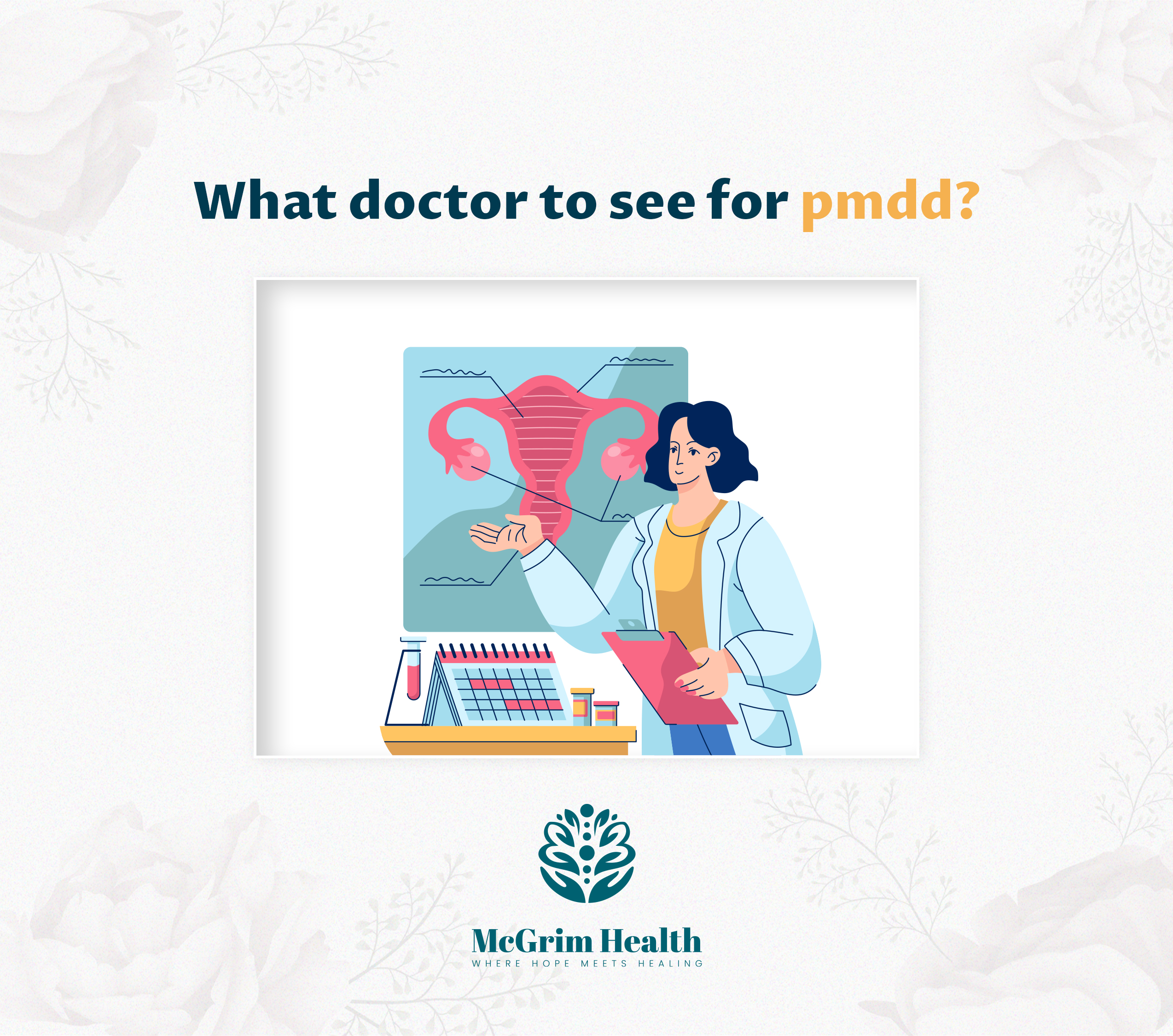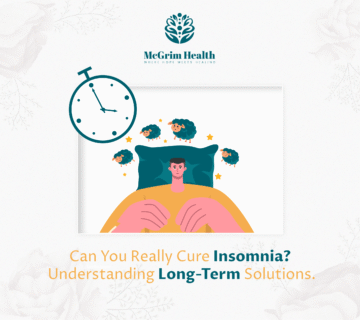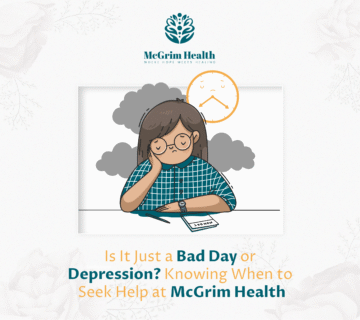Premenstrual Dysphoric Disorder (PMDD) is a serious form of premenstrual syndrome (PMS). It disrupts daily life significantly.
While many women experience mild mood swings and physical changes before their period, PMDD affects 5-8% more severely. This intensity hampers daily tasks and enjoyment.
PMDD’s symptoms are more intense than typical PMS, often prompting medical consultations. It can affect anyone with ovaries, including transgender individuals.
The DSM-5 classifies PMDD as a depressive disorder, highlighting its serious impact on mental health.
If you’re facing this, remember, there’s always a way out. For more information on Premenstrual Dysphoric Disorder (PMDD), please contact us at McGrim Health. Get help and support today.
Dealing with PMDD needs proper support and medical advice. But what doctor to see for PMDD? With many options, how do you pick the right specialist?
Below, we will cover doctors for PMDD and offer tips to choose the best one for you.
Understand PMDD
Premenstrual dysphoric disorder (PMDD) is a severe version of PMS syndrome. It troubles people who are capable of having children.
PMDD isn’t minor it’s keen and relentless and needs help. There are choices, like changes in daily habits or sometimes pills, to deal with the signs of it.
What Causes PMDD?
PMDD’s exact cause is unclear. However, it may relate to abnormal hormonal reactions during the menstrual cycle. These shifts could drop serotonin levels in the brain and intestines.
Serotonin, which narrows blood vessels, also influences mood. This results in emotional and physical symptoms.
Family history affects PMDD risk. If your relatives had PMS, PMDD, or mood disorders, your risk is higher. Similarly, a personal history of depression improves your risk.
Moreover, education level and smoking habits are factors too. Both genes and lifestyle influence who gets this condition.
In severe cases, PMDD may hinder work and daily tasks. Some then seek disability for PMDD if symptoms become debilitating.
What Are the Symptoms of PMDD?
PMDD symptoms start a week before menstruation and fade a few days after. They can disrupt daily life, making home, work, and relationships tough. This disruption is greater than at other times. Common symptoms include:
- Sadness, hopelessness, or feeling worthless
- Increased anxiety or tension
- Harsh self-criticism and sensitivity to rejection
- Mood swings and frequent crying
- Irritability or anger
- Conflicts with others
- Losing interest in activities
- Trouble focusing
- Low energy and insomnia
- Changes in eating habits
- Feeling overwhelmed
- Physical pain or discomfort
PMDD symptoms can mimic other conditions, like thyroid issues and depression.
So, talking to your doctor about diagnosis risk and prevention options is crucial.
What Doctor to See for PMDD?
Choosing the right healthcare provider for PMDD depends on your symptoms and treatment needs. Here are some options:
-
Primary Care Physician (PCP)
Your primary care physician is the best starting point. They’ll take a look at your signs, provide a preliminary cure, and send you to experts if essential.
These doctors are adept at dealing with a range of health problems. They offer crucial guidance and treatments for PMDD. Their in-depth approach crafts them as the perfect first move to handling this ailment.
-
Gynecologist
If PMDD symptoms are severe or persist despite treatment, seeing a gynecologist can be beneficial. For more targeted care, consider finding an ob-gyn specializing in PMDD near me.
Gynecologists specialize in women’s reproductive health and offer treatments specifically designed to address severe PMDD symptoms.
They might recommend hormonal therapies. These include birth control pills and hormone replacement therapy. They may help regulate your cycle and ease symptoms.
-
PMDD Psychiatrist
A PMDD psychiatrist can be a lifeline for severe mood swings from PMDD. These professionals handle mental health hurdles like mood swings or depression.
They know how to prescribe mood stabilizers and antidepressants. These could help PMDD and suggest therapies. For instance, cognitive behavioral therapy (CBT) can manage mood-related symptoms.
-
PMDD Endocrinologist
If you’re dealing with issues tied to hormonal shifts, it might be great to visit an endocrinologist who knows about PMDD.
These experts handle hormone related problems and can shed some light on how changing hormones play a part in your PMDD.
They often propose methods to regulate your hormones, which can ease symptoms.
-
PMDD Therapist
An expert in PMDD therapy concentrates on the emotional side of PMDD. Therapy can promote techniques that help in managing emotional ups and downs.
Methods like cognitive behavioral therapy (CBT) can help. They can control your symptoms. They can also help you manage stress and mental issues.
-
PMDD Coach
A PMDD coach is a specialist giving encouragement and direction to help you control your symptoms. Not a licensed physician, but a PMDD coach can share real life tactics to deal with the disorder and supply emotional reinforcement. They can be an important asset in your health circle, specifically for living and nutritional changes.
Choosing the Right PMDD Doctor
- Assess Your Symptoms: For mild to moderate symptoms, see a regular doctor. Severe symptoms need a specialist, like a gynecologist or psychiatrist.
- Review Current Medications: If your treatment isn’t effective, consult a specialist. They can suggest better options or provide a second opinion.
- Ensure Comfort: You should feel comfortable with your doctor. A trusting relationship often leads to better health.
- Check Insurance and Costs: Review your insurance and appointment costs. Some specialists accept insurance; others do not. Know any out-of-pocket costs before making an appointment.
How to Help Someone with PMDD?
Supporting someone with PMDD means offering kindness and empathy. PMDD provokes significant mood changes, sparking irritability, and depression.
This can lead to a feeling of being alone. Be attentive as they express their feelings and acknowledge their emotions without prejudice.
Urge them to get help from medical professionals as there are useful treatments like hormones, antidepressants, or changes in everyday life routines that relieve symptoms.
Showing patience, giving reassurance, and aiding in setting up a consistent supportive schedule can greatly assist in battling PMDD.
How to Find Doctors Who Treat PMDD Near Me?
To find PMDD treatment near me, follow these steps:
- Research Local Specialists: Look for premenstrual dysphoric disorder specialists Check reviews to find good ones.
- Check Insurance Coverage: Make sure your insurance covers the specialists you consider.
- Get Referrals: Ask your doctor for recommendations. They often know experienced premenstrual dysphoric disorder specialists.
- Consult Online Resources: Use online directories to find nearby PMDD doctors. Reviews can help you decide.
Conclusion
Deciding on the proper healthcare provider for PMDD can be hard.
Yet, having an idea of “what doctor to see for PMDD” simplifies your choice. You could think about an ob-gyn, a PMDD psychiatrist, or a PMDD therapist.
It’s crucial to choose one who grasps your situation. This guarantees improved control of it. Utilize local aids and have conversations with experts to uncover top treatment choices.
Usually, handling PMDD requires varied treatments and assistance. Hence, don’t hold back in asking for help from various places for excellent outcomes.
FAQs
Does Lexapro help PMDD?
Yes, Lexapro is an antidepressant that improves mood and treats PMDD. However, it’s best to consult a PMDD expert or health advisor before starting it.
Will a hysterectomy help PMDD?
A hysterectomy may help PMDD symptoms, but it’s not a guarantee. It’s usually a last resort.





No comment